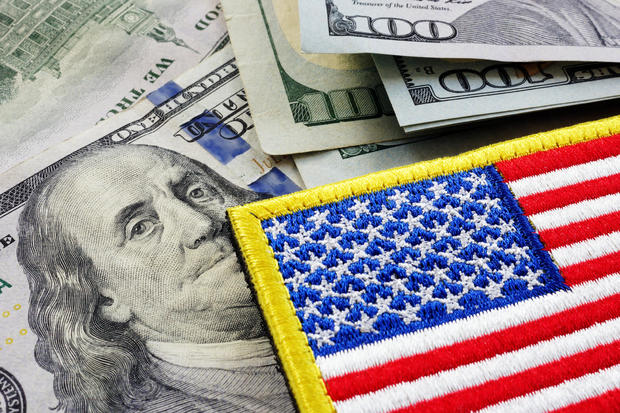We may receive commissions from some links to products on this page. Promotions are subject to availability and retailer terms.

After two years of historically low mortgage rates that triggered a home-buying frenzy, the rising federal funds rate is turning the tide. In mid-September, the average 30-year fixed mortgage rate hit 6% for the first time since 2008 — up from 3.22% just nine months earlier. The decline in purchasing power is causing many buyers to pause their house hunts. However, downward pressure is building on home prices and inventory is adequate.
If you're currently shopping for your next home and want to find the most affordable way to finance it, VA loans are known for their very competitive interest rates. It's simple to check rates and get started.
Here's what you need to know about this unique financial opportunity.
What is a VA loan?
In 1944, the U.S. Department of Veterans Affairs (VA) created the VA loan program to help veterans, service members and surviving spouses more easily afford home purchases. As a result, VA home loans now exist with 100% financing, competitive interest rates, limited closing costs, and no private mortgage insurance (PMI) requirement.
How does a VA loan work?
VA loans are provided by private lenders like banks, credit unions and mortgage companies. The lenders must adhere to the VA loan program guidelines but can set their own underwriting rules. So, as a borrower, you'll have to be eligible with the VA and get approved by a private lender.
Upon approval, the lender will fund your VA loan, you can buy a house and your monthly payments will begin. However, if you happen to default for some reason, the VA is required to pay off your debt (up to a certain percentage). Thanks to this guarantee, the lenders face limited risk when extending VA loans which enables them to offer competitive rates and terms.
If you think you would benefit from taking out a VA loan then act today. Start by checking the rate you qualify for. Representatives are available around the clock to assist you.
Who can benefit from a VA loan?
VA loans can be beneficial for anyone who qualifies thanks to their cost-saving features.
They'll be most helpful for those who need low upfront costs to make homeownership a reality. With a VA loan, you won't have to make a down payment, can skip PMI, and can roll the funding fee into your monthly payments.
Additionally, VA loans can be helpful if you're having trouble getting approved through other programs due to your credit or income situation. Lenders are often more lenient thanks to the VA's guarantee.
How do you qualify for a VA loan?
Before you can qualify for a VA loan, you'll need to get a Certificate of Eligibility (COE) from the VA. Here's what's required.
Minimum active duty service
The VA requires that you served for a minimum amount of time on active duty. The required amount of time will depend on when you served, your type of service and your current status. For example, if you're a veteran who served during wartime, you must have served at least 90 days on active duty.
Note that eligible service members include members of the Air Force, Army, Coast Guard, Navy, Marine Corps, National Guard, Reserves, Commissioned Corps of the Public Health Services and Commissioned Corps of the National Oceanic and Atmospheric Administration.
Acceptable character of your discharge
If you're not currently an active service member, the character of your discharge must have been under "other than dishonorable" conditions (e.g. general, under honorable or honorable).
Surviving spouse
Additionally, spouses of Veterans can qualify for a COE under certain circumstances, such as if the veteran died in service or from a service-connected disability and the spouse hasn't remarried.
You can find the detailed COE requirements online. Further, if you don't qualify for some reason, you can contact the VA to request further consideration.
Once you have a COE, you'll submit it to your lender and move forward with the VA loan application process. The next step will involve the lender assessing your credit, income and overall eligibility based on its internal criteria.
How much does a VA loan cost?
VA loans have favorable terms when compared to many other types of mortgages. However, they still come with various costs. Here's what you can expect:
- The VA funding fee: The VA charges a funding fee that ranges from 0.5% to 3.6% of your loan amount. The percentage you're charged will depend on the type of VA loan you get, whether you've used the VA program before and your down payment amount. The good news? You can opt to pay the funding fee upfront or finance it with your loan.
- Closing costs: Closing costs vary by lender but often include the loan origination fee, VA appraisal fee, real estate taxes, hazard insurance, state and local taxes, title insurance, the recording fee and more. These are due when your loan closes.
- Interest: The rate you get assigned by your lender will determine how much you pay over the life of the loan in interest charges.
Overall, your costs will vary depending on your lender, the interest rates you get and your loan amount. To gain a better understanding of what to expect, when applying, you can request a loan estimate that lists all of your costs.
Speak to a lender today and get started!
Thanks for reading CBS NEWS.
Create your free account or log in
for more features.


